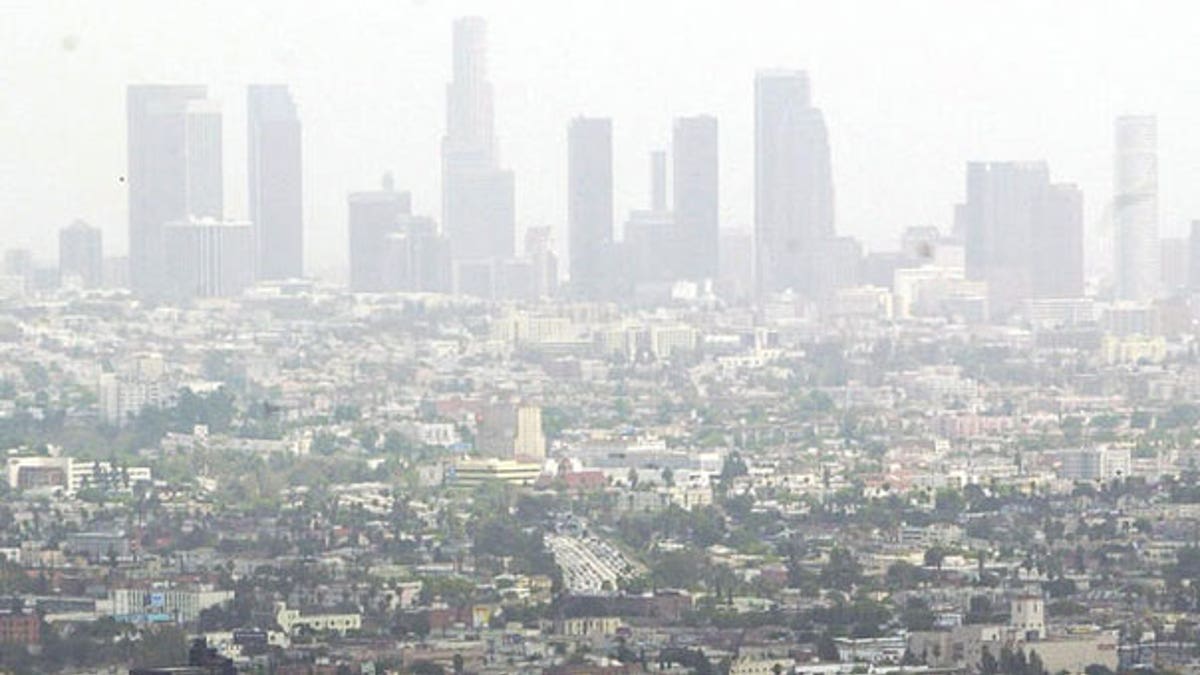
Smog blankets the city of Los Angeles, Calif., in this 2003 photo. (AP)
CHICAGO -- Carbon dioxide is hazardous to your health, the Environmental Protection Agency says. Oh really?
EPA scientists say manmade carbon dioxide and other greenhouse gases are contributing to a warming of the global climate -- and as such represent a threat to human welfare. Officials went so far as to declare the gas a danger to mankind in early December. But a leading climatologist says his research indicates that CO2 poses no threat to human welfare at all, and he says the EPA should revisit its findings.
“There is an overestimation of the environment’s sensitivity to CO2,” said Dr. Patrick Michaels, senior fellow in environmental studies at the CATO Institute and a past president of the American Association of State Climatologists.
Michaels spoke before a group of about 700 scientists and government officials at the fourth International Conference on Climate Change. The conference is presented annually in Chicago by the Heartland Institute, a conservative nonprofit think tank that actively questions the theory of man's role in global warming. Last year the Institute published Climate Change Reconsidered, a comprehensive reply to the United Nations' latest report on climate change.
Michaels described how the U.N. gathers weather information for its computer models, on which the EPA based its ruling. He said data gathering at weather stations in some parts of the world is spotty, and U.N. scientists add new figures to compensate. But in doing so, he said, they also add errors to the final research product.
“There is a systemic bias in the computer models,” said Michaels, whose research suggests that the U.N.’s adjusted computer modeling data, rather than actual observed data, is what connects the rise in temperatures to manmade causes. When one takes away the computerized modeling enhancements, he said, mankind’s contribution to global warming is virtually nil, approximately .03 degrees, rather than .07 degrees, over the last 50 years.
Thus, he said, most of the planet's warming is not from manmade sources. “This idea that most of the warming is due to greenhouse gases caused by man just isn’t right,” he said.
But Catherine C. Milbourn, a spokeswoman for the EPA in Washington, disagreed with Michaels’ conclusions.
“The U.S. Supreme Court ruled three years ago that greenhouse gas emissions constitute air pollution, and EPA set out to determine whether that pollution threatens the health and welfare of Americans," she told FoxNews.com, explaining that the EPA ruling was based on a comprehensive review of available science from an array of peer-reviewed sources across the globe.
"The conclusion: The scientific evidence of climate change is overwhelming, and greenhouse gases pose a real threat to the American people. The question of the science is settled,” Milbourn said.
Greg Wiles, an associate professor of geology at The College of Wooster in Ohio, agreed with Milbourn. “Despite the recent attacks on the scientific community and large-scale buy-in by some of the public, the science behind the conclusion that contemporary warming is largely anthropogenic (manmade) still stands,” he told FoxNews.com.
But others disagree. Former Virginia Gov. George Allen, chairman of the American Energy Freedom Center think tank, said that the U.S. is “at a crossroads in energy policy,” but that the country “cannot stand with pompous elites.”
He noted that a bill has been introduced in the U.S. Senate to essentially veto the EPA’s “endangerment finding” -- and he said that others, like the legislature of the state of Kansas, have also gone on record against implementing an energy policy based on EPA’s findings.
